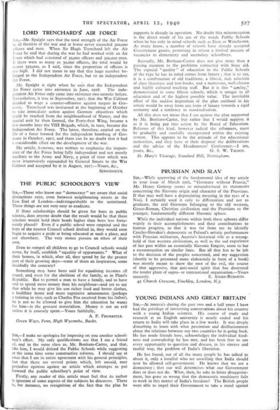THE PUBLIC SCHOOLBOY'S VIEW
Sta,—Those who know our " democracy " are aware that social distinctions exist, even between neighbouring streets in the East End of London—indistinguishable to the Uninitiated. These things are not very easy to eradicate.
If State scholarships should be given for boys in public schools, does anyone doubt that the result would be that these scholars would hold their heads higher than boys less fortu- nately placed? Even if a public school were emptied and the boys of the nearest Council school drafted in, they would soon begin to acquire a pride at being educated at such a place, and not elsewhere. The very stones possess an ethos of their own.
Even to compel all children to go to Council schools would never, by itself, establish "equality of opportunity." What of their homes, in which, after all, they spend by far the greater part of their growing days—some of them an inspiration, some decidedly the contrary?
Something may have been said for equalising incomes all round, and, even for the abolition of the family, as in Plato's Republic. But to permit a man to have a family, and to have and to spend more money than his neighbour—and yet to say that while he may give his son richer food and better clothes, a healthier home and more expensive amusements (perhaps a training in vice, such as Charles Fox received from his father), he is not to be allowed to give him the education he wants for him—is the grossest materialism. Money is not an evil unless it is coarsely spent.—Yours faithfully,


































 Previous page
Previous page